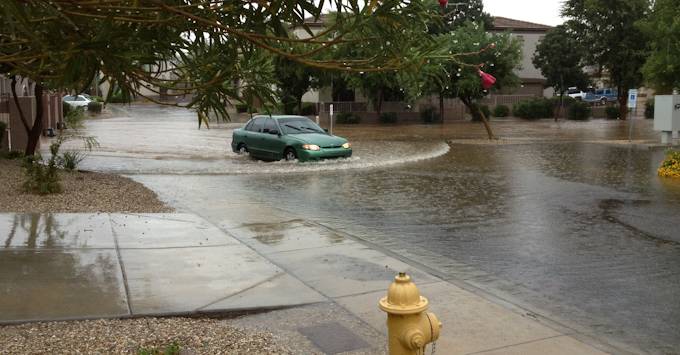
Regardless of whether you live far from water, or right on a lake or river, you are at risk for a flood loss. Imagine, a spring storm hits while the ground is still frozen from the winter. Since the rain can’t seep into the soil, it collects into puddles, then puddles turn into small ponds, then the ponds overflow and there is a river of rainwater running through your front yard. Eventually it finds a path to lower ground, which just so happens to be your basement. This is not the time to wonder if you have flood insurance.
The fact is, almost any home can be subject to flooding. It may come as a surprise to learn that homeowners insurance policies don’t cover losses due to flooding. In order to be covered for a flood loss, you must purchase a flood insurance policy.
What Flood Insurance Covers
Flood insurance protects the buildings on your property and most of the contents inside them. There is limited coverage for contents located in a basement if it is not a walkout. It can reimburse you for losses such as water-damaged floors, carpeting, and walls, as well as possessions like clothing, furniture, electronics, and more. Unfortunately, flood insurance doesn’t cover damage to the land itself due to a flood, so the loss of trees, grass, or landscaping will not be covered.
Now that we know what is covered should a flood occur, we should take a moment to describe what a flood is, and what it isn’t. A flood is defined as: “A general and temporary condition of partial or complete inundation of two or more acres of normally dry land area or of two or more properties (at least one of which is your property) from: Overflow of inland or tidal waters; Unusual and rapid accumulation or runoff of surface waters from any source; Mudflow; or Collapse or subsidence of land along the shore of a lake or similar body of water as a result of erosion or undermining caused by waves or currents of water exceeding anticipated cyclical levels that result in a flood as defined above.” It is important to note that there are other examples of damage caused by water that are not considered to be flood related. A common water loss is when a sewer backs up and ruins a finished basement. In most cases, this is caused by something blocking the sewer pipe such as root growth, and is not the result of a flood. Another common example is when the power goes out or a sump pump fails working and water backs up through the sump pump pit or a floor drain. A separate endorsement to a homeowners policy commonly referred to as Back up of Sewer or Drain can be purchased and a maximum loss amount selected.
How to Buy Flood Insurance
Flood insurance is available through the National Flood Insurance Program (NFIP), which is administered by the Federal Emergency Management Agency (FEMA). To qualify for flood insurance, your property must be within a community that has volunteered to participate in the NFIP.
Flood insurance policies themselves can be purchased from a local insurance agency such as here at Thiel Insurance Group. Since this is a national insurance program, rates are set by the government, and will be the same irrespective of the agency from which the policy is purchased. Your final premium will be dependent on a variety of factors including when the building was constructed, what type of property it is, and the level of risk for flooding. If the city where you live participates in the Community Rating System (CRS), you may receive a discount as well.
While flood insurance is voluntary for many homeowners, it is required for homeowners with mortgages that originate from federally regulated or insured lenders, and the home is located in a high-risk flood area.
Once the policy is purchased, there is a 30-day waiting period from date of purchase before it goes into effect, however, there are certain exceptions for some situations. It’s also worth noting that you must pay for a full year’s premium at the time of your purchase.
Are You Covered for Flooding?
Remember, wherever it rains, there is the potential for flooding, but risk is based on a property-by-property basis, depending on the land and the structure. Take the time to assess whether or not you’re at risk, and if you’re interested in a flood insurance quote, give us a call or stop by one of our convenient offices.
Other Related Links
• Floodsmart.gov

